
views
X
Research source
If you feel yourself craving sweets more often now that you're pregnant, know that this is very normal and common during healthy pregnancies. However, you need to make sure you enjoy sweets and other foods in moderation so that you continue gain the appropriate amount of weight and maintain yours and the baby's health. It's OK to treat yourself to the occasional sweet indulgence as long as you maintain a nutritious and healthy diet.
Incorporating Sweets Into Your Diet

Define moderation for you. If you want to incorporate some sweets into your diet while you're pregnant, it's important to make sure you're only eating them in moderation. If you eat them too often you may gain unnecessary weight. Determine what "moderation" means to you. Is it one sweet a week? Is it two sweets a week? It's a good idea to give yourself a definitive and specific rule to follow so that you don't end up eating too many sweets. The more specific you are the more likely you are to follow your definition of moderation and not go overboard. Make sure your definition of moderation fits in with your overall guidance and dietary advice provided by your OB/GYN. You want to be able to enjoy sweets, but not have them effect your health, your baby's health or your weight. For instance, you might have a little dessert after dinner.
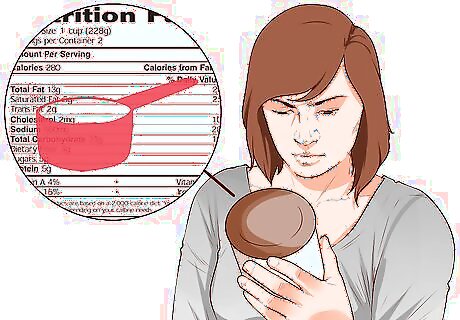
Stick to appropriate portion sizes. When you're incorporating more foods that may be higher in calories or sugar, it's important to stick to appropriate portion sizes. This is what will help keep the overall calories in check. Always read the food label on sweets that come in a package, box or tub. This will give you the serving size, calories, fat, sugar and other nutrient information. Use this information to make sure the treat you plan on eating fits into your overall meal plan. If you're purchasing a "single-serving" treat, ensure the nutrition panel reads "one serving". Sometimes a small bag may seem like one serving, but may be 2 servings instead. If you're unsure of the serving size (for example, if someone brings in cupcakes to work), aim to eat about 1/2 cup or about 4 oz. This is about 1/2 of the size of your fist. Another trick is to split desserts and treats with your friends, family or husband. This is an easy way to enjoy desserts that are portion controlled.

Add in sweets that have nutritional benefits. When you're pregnant, you need to be vigilant with your overall nutrition to make sure you're consuming adequate amounts of every nutrient to support your pregnancy. Use your sweet treats to your advantage and choose a treat that also has nutritional benefits. Dark chocolate. This tasty sweet is full of wonderful nutrients. It's known to be high in antioxidants like flavonoids and flavonols. Dark chocolate may help support a healthy cardiovascular system and protect your body from damage by free radicals. Berries. Raspberries, blueberries, blackberries and strawberries are all nutrient power houses. They're also known for being very high in antioxidants and may help prevent anything from diabetes, high blood pressure and cancer to preventing wrinkles. Apple and pears. Both of these fruits are known to be very high in fiber. With about 5-6 grams of fiber per apple or pear, these fruits will help keep your GI in good shape. Nuts. These high protein legumes are also a great source of heart healthy fats. They've been shown to help lower cholesterol levels and reduce your risk of blood clots. Also, nuts, nut butters, flax seeds, and chia seeds can help decrease your cravings for sugar.

Avoid "diet" sweet treats. You may think that if you want to gain a healthy amount weight during your pregnancy that you should choose low-calorie, "diet-friendly" sweet treats. However, you may want to avoid these low-calorie substitutes. Although it's a great option to have low-calorie, low-fat or low-sugar sweet treats available, many of these "diet" treats are overly processed, contain many types of artificial sugars and sweeteners and have many added preservatives and other chemicals. Although there is no strong research that advises pregnant people to stay away from ingredients like artificial sweeteners, you may want to choose more all natural, less processed foods while you're pregnant. In addition, "diet-friendly" sweets may not taste as good or be as satisfying as the full-fat or "regular" versions of desserts. It may be better to have one higher calorie dessert once a week rather than a diet dessert everyday. Limit or avoid treats like: sugar-free ice-cream, "100-calorie packs", sugar-free chocolates and candies, and diet cakes or pies.

Make nutritious versions of your favorite sweets at home. Keep your sweets more nutritious and less processed by making some of your favorites at home. You can control what goes into your treats and keep both calories and sugar in moderation. Try: Dark chocolate dipped bananas. Freeze halved bananas and then roll the halves in melted dark chocolate. Freeze again and save for when those sweet cravings hit. Chocolate berry smoothie. Blend together some greek yogurt, milk, a handful of your favorite frozen berries and chocolate syrup for sweet beverage. Sautéed apples with whipped cream. Sauté some apples or pears with a little butter and cinnamon until they're softened. Top with some chopped nuts and a dollop of whipped cream.
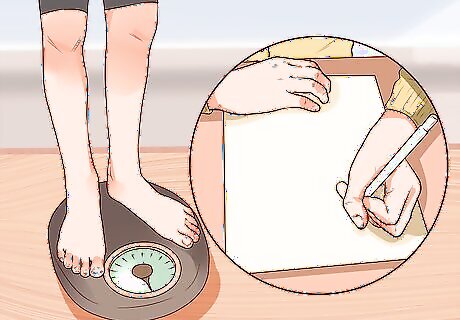
Track your weight gain weekly. It's expected and needed for most pregnant people to gain some weight as their belly and baby grows. However, if you're eating too much - especially sweets - you may gain too much weight during your pregnancy. Excessive weight gain during pregnancy is not safe or healthy for you or your baby. You're more at risk for developing gestational diabetes and having an overweight or obese child. If your BMI is 20.0 to 24.9 you should gain about 25-35 pounds during your pregnancy. If you have a BMI of 25.0 to 29.9, should gain 15 to 25 pounds during your pregnancy. If you have a BMI of 30.0 and above, you should gain 11 to 20 lbs. Track your weight weekly and keep in contact with your OB/GYN to make sure your weight gain and rate is appropriate. If you think you're gaining too much or gaining too quickly you may need to cut down on the amount of sweets you're eating.
Managing Cravings During Pregnancy

Make a healthy sweet swap. Cravings can be difficult to manage, especially during the first and second trimester. If you catch yourself having sweet cravings on a regular basis, find healthy swaps to help you limit your overall sugar consumption. Find some healthy swaps to help keep your diet more nutritious and moderate in calories. Eating a higher calorie sweet treat on a regular or daily basis may be too many calories for you. This could cause you to gain too much weight during your pregnancy. Go for fruit. If you're craving something sweet after a meal, try settling that craving with a sweet piece of fruit. Make sure to choose ripe fruit that has a sweet flavor. Try: bananas, pineapple, mango, peaches or berries. Have a cup of tea. Another trick to satisfy a sweet craving is by having a cup of hot tea. Pick a flavorful brand with natural sweetness - like orange cinnamon or chai - and add a drop or two of honey or agave syrup. Have some yogurt. Stock up on some of your favorite yogurt flavors. These are naturally sweet and with some added fruit, this can really satisfy your sweet tooth.

Add some sweetness to your meals. Another way to manage your sweet cravings is by adding something sweet to your meals. Tasting sweets during your meal can help decrease the desire to end your meal with a treat. Try: Adding sliced fruit or dried fruit on a salad. Fruit pairs well with many lettuces and dressings and can add a sweet bite to your fresh salads. End your lunch with a piece of fruit. Pack a piece of fruit with your lunch and eat this last. Whether its a few grapes, a sliced apple or a fruit cup, ending your meal by eating your serving of fruit last leaves the sweet flavor in your mouth.

Distract yourself. Although pregnancy cravings are common, they are not a sign that you need any nutrients or specific foods. Work on moving past and ignoring some of your cravings so that you can stick to your definition of moderation. If you're having a very strong craving and can't move past it, indulge yourself. However, if it's not an overly strong craving or you know you just had a small bowl of ice cream last night, consider moving past your craving. Try going for a short walk. A little exercise is a great way to get your mind and eyes off of sweets that may be hanging around your house. Walk for 10-15 minutes at a time and revisit your craving when you get home. Try calling a friend or family member to help distract you mentally from your craving. You can also ask them to be your support and help you stick to your definition of moderation. If you have a baby on the way, there are probably plenty of things you can be doing around the house to get you, your family and your home ready for the new baby. Distract yourself by going shopping for things you may need, looking online for a crib, or planning out your new nursery.

Minimize the sweets in your house. If you're having significant sweet cravings, it can be difficult to manage them or stick to your definition of moderation if your pantry, refrigerator and freezer are full of sweets. Limit how much you keep in your house so you're not so tempted. If you notice that your cravings are getting worse or you're having difficulty managing them, consider cleaning out your kitchen to help you avoid overdoing it. First consider getting rid of highly processed processed sweets or those that are overly high in calories or fat. Items like snack cakes, candy or fruit treats do not offer many health benefits and are overly processed. Keep some of those healthier snacks or sweets on hand. Stock your kitchen with dark chocolate bars, fruit, or some of your homemade treats (like frozen, chocolate dipped bananas).
Maintaining an Overall Nutritious Diet During Pregnancy

Eat adequate amounts of protein. In addition to monitoring weight and sweet cravings, it's important to maintain an overall nutritious diet. This means eating the right about of protein for you and your growing baby. It's typically recommended for pregnant people to eat about 75-100 g of protein each day. Adequate protein helps support your growing baby's development (especially their brain) in addition to supporting the growth of your uterus and breast tissue. Include 1-2 servings of protein at each meal. One serving is about 3-4 oz or about the size of your palm. Choose foods like poultry, eggs, low-fat dairy, lean beef, pork, legumes and tofu. Seafood is another great option but only choose fish and shellfish that are low in mercury and are fully cooked. Both proteins and healthy fats, like olive oil and coconut oil, can help diminish your cravings.
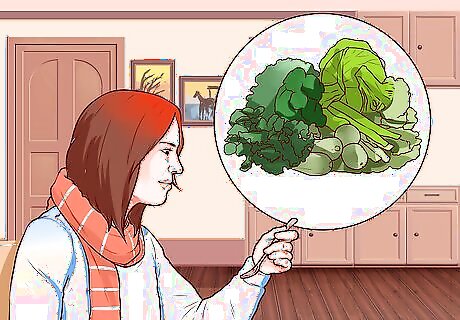
Fill up on fruits and vegetables. Another set of important food groups are fruits and vegetables. This is where you will get the majority of your fiber, vitamins, minerals and antioxidants to support a healthy pregnancy. Aim to eat at least 5-9 servings of fruits and vegetables each day. To get this amount, you'll need to eat at least 1 or 2 servings per meal. Aim for about 1 cup of vegetables, 2 cups of leafy greens and 1/2 cup of fruit. Make sure to focus on folate rich vegetables like: dark greens (turnip greens, kale, spinach and cabbage), tomatoes, oranges, strawberries, mangoes and grapefruit. Folate is essential for the normal growth and development of your baby's brain and spinal column.
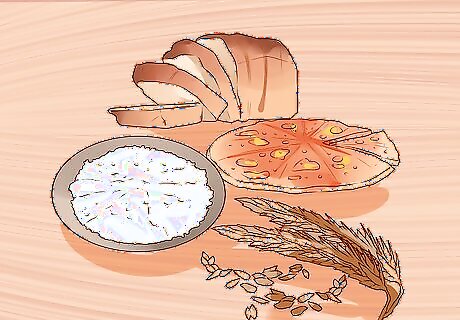
Go for 100% whole grains. If you can, when you're choosing to eat foods like, bread, rice, pasta or tortillas, aim to choose 100% whole grains. These foods have many more nutrients that refined grains. Refined grains are overly processed while whole grains are much less processed. Whole grains contain all the parts of the grain which make them much higher in fiber, protein and other essential nutrients. In addition, some whole grains are especially high in folate - like bread, cereals, oatmeal, cornmeal and pasta. Serve yourself a 1/2 cup or about 1 oz of whole grains per serving.

Drink adequate amounts of fluid for your pregnancy. Like foods, water is another important nutrient that you must consume in adequate quantities for a healthy pregnancy. In addition, you have increased fluid needs during pregnancy making this even more essential. Typically, pregnant people need to drink about 2 or 2 1/2 liters of hydrating fluids each day. Try to stick to calorie-free, decaf beverages as these are the best and most hydrating. Try: water, flavored water, sparkling water, decaf coffee and tea. Even skim milk has some water plus the added protein and calcium.

Take a prenatal vitamin daily. Although you may be eating a very balanced and nutritious diet, it's still important to take a daily prenatal supplement. These are designed to fill in any nutritional gaps that your diet doesn't meet. When you're pregnant you need to make sure you're getting adequate nutrition everyday in order to support your growing baby. Prenatal vitamins are an easy way to make sure you're doing this. In addition, they are typically higher in folate and iron which are important in the normal development of your baby's brain, spinal cord and the prevention of anemia. Always talk to your OB/GYN prior to starting any supplement - even a prenatal vitamin - to make sure it's safe and appropriate for you.














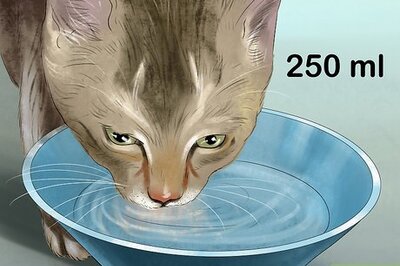





Comments
0 comment